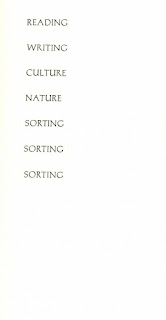Flow and Fold
Not a wonder that my reading stumbles and sees "loss" for "less" in these lines from Suzanne Buffam's Past Imperfect from the sequence entitled "Inklings": "to retrieve it you'd think / we'd be gifted with less."
Earlier we encountered this in "Sire Gromore Somyr Joure" which builds upon delicate repetition that becomes slowly attenuated.
Knees were for kneeling. Lashes were for lookingAnd later the notion of loss bites again in the conclusion of a poem called "What is Called Déjà Vu"
at the sun. The river was slow and it hurried.
like a dream inside which a crouchedSame familiar facility with repetitions and alliterations and the zest of the zinger.
animal is awaiting
release, recognition.
Its little teeth glisten.
And so for day 1844
31.12.2011





